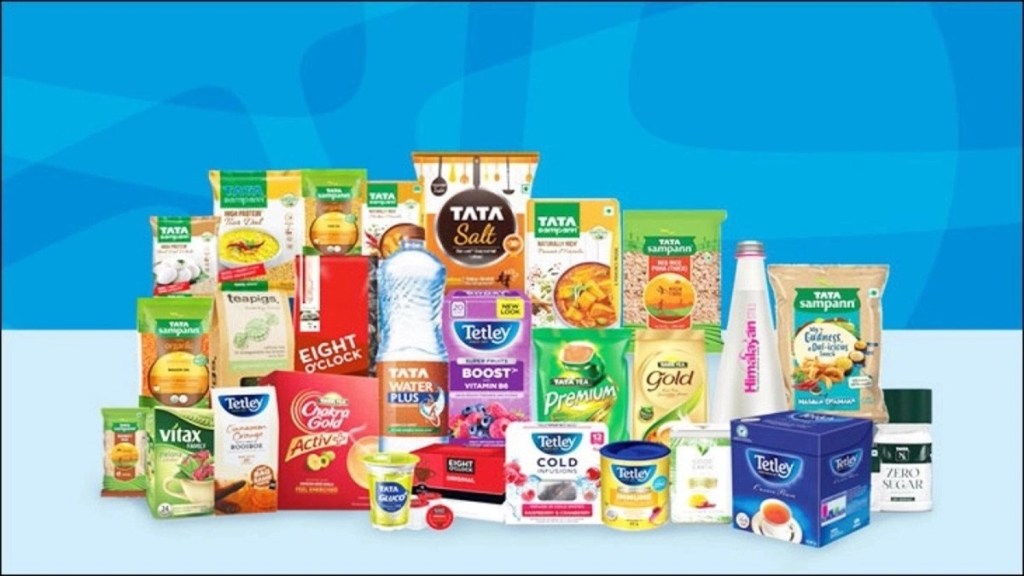By Shubhra Tandon & Kritika Arora
Tata Group company, Tata Consumer Products (TCPL) is looking at a larger FMCG play, going beyond the food and beverage segments that it currently operates in, Sunil D’Souza, managing director and CEO, told FE.
“Tata Consumer has been built to fulfil the FMCG ambitions of the (Tata) group. While we started off as a food and beverage company and we want to be top notch food and beverage company, in the longer term we will be a large premier FMCG company in India, along with global business. We are starting to think how to expand beyond food and beverage,” D’Souza said.
At present, Tata Consumer is a food and beverages company. It derives around 75% of its consolidated sales from beverages and 25% from foods business. Its key beverage brands include Tata Tea, Tetley, Eight O’Clock Coffee, Tata Coffee Grand, Himalayan Natural Mineral Water, Tata Water Plus and Tata Gluco Plus. Its foods portfolio includes brands such as Tata Salt, Tata Sampann, Tata Soulfull and Tata Q.
TCPL is already in the midst of simplifying its organisational structure and is undergoing a restructuring of its over 43 legal entities in the international markets. The company is looking at bringing these down by about half to around 23-25, and then perhaps look at cutting the number down even further.
Also Read: Govt drops plan to sell Pawan Hans, Central Electronics
The move is in line with Tata group’s overall thrust on ‘Simplify, Synergise and Scale’ as also articulated by N Chandrasekaran, the group chairman. TCPL had said in March that the company is undertaking a two-step simplification of its entire structure, one is the India leg and one is the international leg.
“This organisation has grown through acquisitions in the past, especially on the international space. We took over Tetley and then between Tata Coffee and Tata Consumer we bought out Eight O’Clock Coffee, and then we bought Good Earth in the US, and those entities themselves had multiple holdings. So, over the years we have collected these entities and now in one shot we are cleaning these pieces up,” said D’Souza.
He added that these multiple entities not just lead to legal and administrative costs but also have resulted in ‘inefficiencies’ in managerial time, and also on cash and dividends. “On the international leg, we have got 43 legal entities for a business which is not so complex in terms of products. In the US we have got three lines of business — tea, coffee and tea extracts and we have got 10 legal entities, so there is enormous amounts of inefficiencies that sits with legal entities,” he said.
On the India leg, TCPL is looking at bringing the Tata Consumer’s tea extraction business and Tata Coffee’s extraction business together to build a B2B vertical of extractions. D’Souza said that the company will start with tea and coffee and then look at various other extractions as well because the customers are common and have similar manufacturing processes in the back-end. “It is perfectly synergistic. So, we will demerge the extractions business and put it into Tata Consumer and create one single vertical of extraction of Tata Consumer,” he said. TCPL will also be merging Tata Coffee’s plantations business into its own wholly-owned subsidiary of plantations. The two put together will simplify the structures and there will also be synergies in terms of different costs, he added.
“Today in Tata Consumer we have got packaged beverages, packaged foods, ready-to-drink beverages under Nourishco, and then we have got mini-meals snacking under Soulfull. So, on the India leg, extractions and plantations vertical will get added. In international, we run by country and not by categories,” D’Souza said explaining the final structure of the company.
TCPL has sought approvals from the Reserve Bank of India (RBI) to clear the international holding piece and National Company Law Tribunal (NCLT) clearance on the India business restructuring, which may come through by June 2023. D’Souza said that within 3-6 months of approvals coming in the entire exercise will be complete.
However, he added that the company will continue to explore whether the structure can be simplified even further. “In an ideal scenario if we were to start this business all over again it should be between 3-5 entities globally,” he said.

